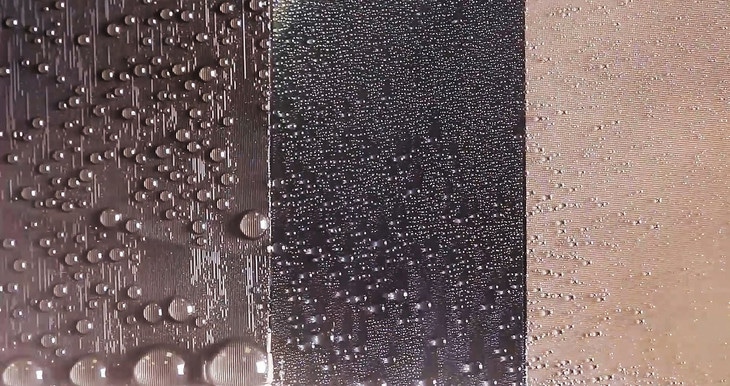Apr 2 2018
A research team from Penn State and the University of Texas at Dallas has designed a slippery rough surface (SRS) based on pitcher plants as well as rice leaves. The surface performs better than ultramodern liquid-repellent surfaces used in water harvesting applications.
 In the image, the left panel is a directional slippery rough surface (SRS, this study), the middle panel is a slippery liquid-infused porous surface (SLIPS), and the right panel is a superhydrophobic surface. This image shows a comparison of water harvesting performance of SRS vs other state-of-the-art liquid repellent surfaces. (Image credit: Xianming Dai/Nan Sun/Jing Wang/Tak-Sing Wong/Penn State)
In the image, the left panel is a directional slippery rough surface (SRS, this study), the middle panel is a slippery liquid-infused porous surface (SLIPS), and the right panel is a superhydrophobic surface. This image shows a comparison of water harvesting performance of SRS vs other state-of-the-art liquid repellent surfaces. (Image credit: Xianming Dai/Nan Sun/Jing Wang/Tak-Sing Wong/Penn State)
The researchers have published their study online in Science Advances, an open-access journal, on March 30, 2018.
With an estimated 4 billion people living in a situation of water scarcity during at least some part of the year, an inexpensive method for harvesting water from water vapor or from fog droplets in air could have enormous practical applications, and will help alleviate the water scarcity issues in many regions of the world.
Tak-Sing Wong - Project Leader, Wormley Family Early Career Professor in Engineering & Assistant Professor of Mechanical Engineering, Penn State.
Various water-harvesting applications are not very efficient due to the fact that water attracted toward a hydrophilic surface has the propensity to form a sheet and sticks to the surface, rendering it difficult to remove. However, Wong’s post-doctoral scholar Simon Dai, who is an assistant professor at UT Dallas at present, was considering a blend of several biological approaches to developing a slippery solution for water harvesting.
With SRS, we combined the slippery interface of a pitcher plant with the surface architecture of a rice leaf, which has micro/nanoscale directional grooves on its surface that allows water to be removed very easily in one direction but not the other.
Simon Dai
Dai created a pitcher plant-based slippery surface with hydrophilic chemistry. Simultaneously, directional grooves were added to give the new surface a microscale roughness that would increase the surface area. The rate of fog and water harvesting were seen to increase with an increase in the amount of surface area on which droplets were formed. The rice leaf-based grooves whisked the water droplets away through gravity or capillary action.
By conducting experiments at Penn State, the researchers demonstrated that these surfaces had the ability to collect tiny droplets of water from air at a rate faster than many ultramodern surfaces. Molecular dynamics simulations performed by Steven Nielson, Dai’s colleague, at UT Dallas elucidated the reason for the hydrophilic surface to be specifically good at water harvesting.
“If the SRS material is produced at scale, we estimate that we can collect over 120 liters of water per square meter of the surface per day, and we can further increase the water harvesting rate by optimizing the SRS,” stated Nan Sun, graduate student in Wong’s group and coauthor of the paper titled “Hydrophilic Directional Rough Surfaces for Water Harvesting.”
At present, Wong and his team are striving to optimize and scale up the SRS with the aim of developing highly efficient water harvesting systems that can provide clean water in regions affected by water scarcity.
Other Penn State researchers who were part of the study are graduate students Birgitt Boschitsch Stogin and Jing Wang; and Shikuan Yang, former post-doctoral scholar in Wong’s lab who is a professor at Zhejiang University at present. The team has filed a U.S. provisional patent for this study.
This study was supported by the Materials Research Institute at Penn State, Covestro LLC, the Office of Naval Research, Advanced Research Projects Agency-Energy, and the National Science Foundation.